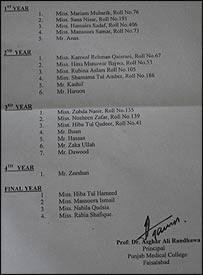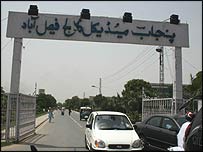Atif Mian
 On Thursday, June 5th, the principal of Punjab Medical College, Faisalabad, expelled every student who belonged to the Ahmadi community from the college.
On Thursday, June 5th, the principal of Punjab Medical College, Faisalabad, expelled every student who belonged to the Ahmadi community from the college.
A total of twenty three students, fifteen female and eight male, across the five years of medical school have been expelled as a result. Further details regarding the incident can also be found in reports from the BBC and from the Daily Times.
The Ahmadi students were “accused” of preaching their religious beliefs. The principal was pressured into expelling the entire Ahmadi student body by a mob of protesters belonging to Islami Jamiat e Talaba. The mob circled the Principal’s office and demanded the expulsions. The same day, a mob of about 300 college students also barged into Ahmadi students’ rooms, beat them and threw their luggage out of their rooms.
 What makes this incident especially troubling is the fact that the decision to expel Ahmadi students was taken by a government-run medical school, under full knowledge of the relevant Punjab ministries.
What makes this incident especially troubling is the fact that the decision to expel Ahmadi students was taken by a government-run medical school, under full knowledge of the relevant Punjab ministries.
![]()
As an academic, and a Pakistani, I am totally appalled by this latest incidence of religious fanaticism. One hopes that the present Punjab government turns a page, and instead of supporting the forces of extremism, comes to the protection of its ordinary citizens.
Atif Mian is Associate Professor of Finance at the University of Chicago, Graduate School of Business.



















































Waseem, how is Khalid “completely ignorant and in a confused state of mind”? Your choice of words undermine your efforts, good intentioned as they may be. Khalid was offering an argument against another poster (Ordinary Citizen) who defended the Pakistani laws that forbid Ahmadis from saying Salaam.
BTW, the Objectives resolution only mentioned the right to profess and practice one’s religion, not to propagate it. I checked Article 20 of the constitution. It does provide the right to propagate one’s religion, but has caveats. Even something as fundamental as the freedom of speech (which itself is usually adequate to guarantee freedom to propagate one’s religion) is subjected to “reasonable restrictions in the interest of the glory of Islam” amongst other things. Taken together, a case can be made that the constitution puts restrictions on the propagation of religions other than Islam (or pronounced as being as such, like the Ahmediya example shows).
Guys,
I am sorry, but the question over here is not to justify what happened under the light of the pakistani constitution or whatever reference from the history.
This is a question of attitudes. That of the direction that pakistanis want to give to their society.
What we should ask ourselves is that:
1. should citizens of pakistans be discriminated on whatever grounds?
2. should someone be condemned under whatever sort, true of supposed, of blasphemy?
3. should a group of students be allowed to ask expulsion of another group of students?
4. should a group of students be allowed to actually beat up and move another group of students?
5. on religious grounds, should it be accepted that the faith of a group of paksitanis is inferiour to the others?
The rest is of little relevance.
The roots of the current situation can be traced back to the Objectives Resolution itself. It laid out a clearly different status for Islam in the polity and that was forced through despite the unanimous opposition of all minority members of the Constitutent assembly. And this was in a country where 15% of the population was non-Muslim as per the 1951 census – leave aside the minority proportion if one were to take minority sects into account. (It is unlikely that Jinnah would have allowed this to happen). It was a slippery slope after that. Even in the 1950s, it was clear that there would be no agreement between sects about their interpretation of Islamic law (refer the Munir report). The Ahmediya issue is only the most extreme and perverse example of what can go wrong in a polity that places one religion above others in the public sphere.
YLH refers to the basic structure of the constitution. First of all, I don’t think the basic structure of Pakistan’s constitution has quite the solid backing of tradition that the US constitution has or even the backing of case law that the basic structure of India’s constitution has acquired (through Supreme Court judgements on the issue). Even if it were, the primacy given to Islam in the constitution is also a part of the same basic structure. And that can be used to justify the Admediya-related laws on the statute books. It is debatable what even a free and fair court may pronounce on this issue because of the conflict between two basic elements of the constitution.
Thus, to my mind, the issue cannot be solved unless Pakistan adopts a secular constitution, not in the sense of promoting irreligiosity, but in the sense of not having anything to say about religion whatsoever (other than providing fundamental rights to profess, practice and propagate any religion). It is not easy – people would have to be convinced that this means no disrespect to Islam or even any dilution of the place that Islam plays in people’s lives. But it is the only way to arrest the decline.
My two cents on the issue.
I read the news on BBC on Friday and knowing Pakistan as well as I do, I was just thinking about the students who aspire to become doctors and are now expelled.. Even if they are taken back what kind of life would they have on campus. When will this end? I actually remembered a short paper I had written in a western civ. class many many years ago which dealt with the 150AD onward period when it was a crime to be a Christian and they were often killed just to entertain the masses. I remember a quote from that era: